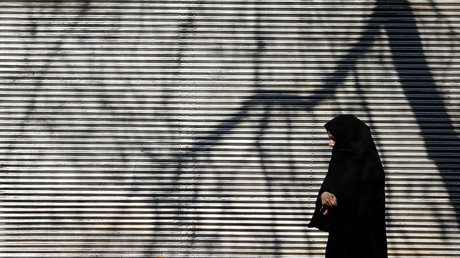Religious code of conduct adopted at German university after complaints about Muslim students

The University of Hamburg has imposed a new religious code of conduct for its students. It reportedly comes after numerous complaints about Muslim students praying loudly in the library and crowding the bathrooms to wash their feet.
The new code was drawn up by a philosopher and a group of religious scholars at the university, according to Inside Higher Ed (IHE). The rules were implemented in mid-October.
According to Hamburg University President Dieter Lenzen, the move came after a number of complaints about religious students “disturbing university life.” He added that “external Salafists” had been pressuring female Muslim students to wear traditional Islamic garb, including the face veil.
When asked which faith had been the subject of the most complaints, Lenzen said with emphasis that the answer was Muslim students. “To date, there have been no complaints about Buddhist students, just a few about Christian students, but a great many about Muslim students," he said, as quoted by IHE.
One of the subjects of the new code is prayer. It bans “loud and demonstrative expressions of faith,” but notes that “quiet prayer may be acceptable in the library.”
It states that “ritual activities” must be “non-disruptive or carried out in rooms assigned for that purpose.” It cites an area known as the ‘Room of Contemplation,’ while warning that students are not allowed to segregate that area by gender.
The code warns that the unauthorized use of university facilities and resources could result in guilty parties being banned or expelled from campus. “This authority may be delegated,” it states.
The code also bans foot baths in sanitary facilities, noting that such actions could make other students “feel imposed upon.” It warns that “religiously motivated pressure” upon others to behave in a certain way constitutes “coercion.”
The text also deals with dietary restrictions at campus eateries. It states that canteens “reserve the right to decide whether or not to offer dishes in line with religious dietary guidelines and restrictions,” while noting that it would be “desirable” if the university’s student organization could “include dishes that accommodate the dietary rules of the various religions.”
It also stresses that students who miss class due to religious festivities will have to “bear the consequences,” adding that “teachers may request that the student in question compensate for missed work.”
When it comes to religious apparel, the code stresses that students are permitted to wear items including the Muslim face veil. However, that is only if they are not deemed to “impede communication required for academic exchange, instruction, or exams...”
Speaking to Ruptly about the new religious code, a Muslim student by the name of Akbar stressed that it is important for everyone – not just Muslims – to have the freedom to wear what they please. “If someone stood naked in front of me, I wouldn’t like that, but if they want to be naked… it doesn’t matter to me.”
A student named Daniel noted that the topic of Islamic apparel “is different from case to case,” stressing that women are sometimes forced to wear such clothing by their husband or father. “It should be possible for everyone [to wear full covering] but not from being forced. And that’s difficult to establish, whether they are forced or not,” he told Ruptly.
The topic of Islamic garb has been a subject of intense debate across Europe, with a so-called ‘burqa ban’ going into effect in Austria last month. In September, the German parliament’s upper house passed new rules to prevent drivers from covering their faces to avoid speeding tickets, in a move which some claim unfairly targets female Muslim drivers. Meanwhile, the Danish ruling coalition has also expressed its support for a nationwide full-face veil ban.














